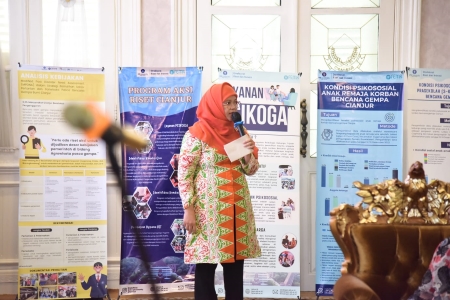PSIKOGA: Psychological Strengthening Services for Families of Cianjur Earthquake Victims

IPB University launched PSIKOGA, a psychological strengthening service program for family members of Cianjur earthquake victims. The launch of the PSIKOGA program took place at the Cianjur Research Action Program which was held by the Directorate of Research and Innovation (DRI) IPB University in Cianjur Regency, (30/3).
PSIKOGA services are carried out by 10 trained volunteers consisting of IPB University students from undergraduate and postgraduate programs. The volunteer training was carried out by IPB University lecturers from the Department of Family and Consumer Sciences (IKK), Faculty of Human Ecology (Fema), Dr. Melly Latifah, Nur Islamiah MPsi, and a team of Character Education Labschool teachers.
PSIKOGA services will be held on 12-18 December 2022 in Gasol Village and Cigrass Village, Cugenang District, and the Prawatasari Park Refugee Post, Cianjur. The activity was carried out in collaboration with the Indonesian Ministry of Health, the Cianjur District Health Office, the Bogor City Police, and PT Tirta Pakuan Bogor.
“The earthquake natural disaster that occurred in Cianjur Regency, West Java had an extraordinary impact on all aspects of the lives of the victims. Apart from causing physical and social problems, earthquakes also leave psychological problems such as post-traumatic stress disorder, anxiety, and other mental health problems," said Dr Tin Herawati, Head of PSIKOGA Services.
She explained, among the victims' family members, children were the group most vulnerable to psychological problems. Psychological problems that arise, among others, are caused by loss of control over fear due to sudden, unexpected, and uncontrollable earthquake vibrations. It can also be caused by physical injury and loss or death of family members due to earthquakes.
"As many as 45.5 percent of preschool children (out of 33 children) were found to be victims of the Cianjur earthquake and 61.7 percent of teenagers (out of 34 teenagers) experienced rather severe psychological symptoms," she said.
Dr Tin Herawati said that the most common psychological symptom experienced was trauma. This is because most of the children felt the earthquake which was considered frightening so it seemed as if the earthquake was happening again, feeling restless, easily startled, difficulty concentrating, difficulty sleeping, and irritable.
"Another symptom experienced by adolescents is feeling unhappy and having negative thoughts about life in the future and feeling that there is no one they can trust," she added.
Furthermore, Dr Tin Herawati said that the presence of PSIKOGA services could reduce the psychological symptoms that appeared. "PSIKOGA provides educational games and fun activities for children. Volunteers also listen and provide solutions to problems faced by families while in evacuation through the family counseling process.”
According to him, PSIKOGA does not only deal with psychological problems. Volunteers also help distribute medicines, food, and hygiene kits to families. In its implementation, PSIKOGA services collaborate with various related parties to make it easier to deal with problems faced by families while in evacuation.
“Research results show that psychological problems in children and adolescents related to natural disasters will last long after the disaster incident. Therefore, there is a need for continuous psychological assistance for family members of earthquake victims in Cianjur," she said.
Dr Tin added several other recommendations that needed to be made, including child and family-friendly evacuation facilities, educating parents on how to assist children with psychological disorders, and accelerating relocation or home renovation so that families could gather in a more comfortable and healthy place.
“Another recommendation is to facilitate access to education for children, bearing in mind that many of them stopped going to school due to the disaster. In addition, we need play areas or fun activities for preschoolers and teenagers so that they can improve the psychological disorders they experience," she concluded. (*/Rz) (IAAS/TNY)


